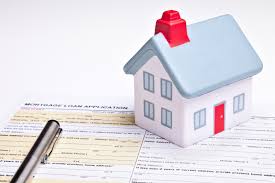Sep 29, 2017 | Uncategorized
You’ve been paying your mortgage for a few years, and interest rates go down. Suddenly, you hear everyone talking about how now is the time to refinance your mortgage… banks, credit union, friends, family. And while you’re somewhat familiar with the concept of refinancing, you don’t know if it’s in your best interest to do so right now. You might actually be asking yourself, “What are some signs you should refinance your mortgage?”
Here are some key signs that it’s time to do so.
1. Refinancing at the new interest rate would save you significant money in the long term.
When you first start paying off your mortgage, the majority of what you’re paying goes toward interest. Because of that, when you’re still early on in making your mortgage payments, you can save a lot of money if you’re able to pay off your loan in the same amount of time but at a lower interest rate.
For example, if you originally were approved for a 30-year mortgage at 3.6% for $200,000, and you still have 25 years left on your mortgage, and you can refinance at 3.4%, you would save $80,000 over the next 25 years, assuming the new loan had a term of 25 years. In addition, your loan payments would be less. In this example scenario, you’d be paying approximately $20 less each month after refinancing.
Keep in mind: because you’re paying more interest early on in your mortgage, it will make most financial sense to refinance early on when making your payments, if interest rates decrease. To see how much you could save by refinancing, try our mortgage calculator.
2. You can decrease the length of your loan from 30 years to 20 or 15.
Often, homeowners look to refinance their mortgage after a few years. Since most people have a 30-year mortgage, they probably have 20-25 years remaining on their mortgage when they begin thinking about refinancing. If you’re able to decrease the length of your refinanced loan from 30 years to 20 or 15 years, you will be eligible for even better interest rates, which means you can save even more on your new home loan. Not only could you pay off your loan sooner than you might have, but you could still have a lower monthly payment.
In the current market, we can offer 3.25% interest for a 15-year fixed mortgage and 3.99% for a 30-year fixed mortgage. Since a 0.2% difference in interest can save tens of thousands of dollars, moving from a 30-year fixed mortgage to a 15-year fixed mortgage can often save you hundreds of thousands of dollars, depending on when you refinance, and whether or not interest rates have decreased.
3. Even though you’ve been making your mortgage payments on time, you want to make a lower monthly payment.
Earlier, we mentioned that your monthly payment could be lower simply from refinancing if the interest rate is lower. However, another thing that can lower your monthly mortgage payment is extending the term of payment. If you have already paid on your mortgage for 5 years, you can spread out the remaining balance over 30 more years if you refinance. Even if the interest rate doesn’t change, you can still pay hundreds less per month.
For example, if you had a home loan of $300,000 at 3.4% interest that you were considering refinancing after 10 years, you could refinance and have a new home loan that also had a 30-year term. In this instance, you would have already paid $68,000 of the principal after 10 years, so your new loan would be for $232,000. If you wanted to pay the remaining balance over 30 more years, you would be paying an average of $1,450 per month instead of continuing to pay $1,750 per month.
Key Takeaways
In all, if you have at least a third of your mortgage left, and interest rates are going down, it’s worthwhile to consider refinancing. Remember, the amount of the principal that you’ve already paid off is paid off for good, so the balance of your refinanced home loan will be less. You can make refinancing work for you and your financial goals, whether that’s paying less per month, paying off your mortgage in fewer years, or saving money over the length of your mortgage.
To learn more about how much you can save by refinancing your mortgage, contact us at Easy Mortgage today!

Aug 25, 2017 | Uncategorized
You’ve already asked the important questions to know whether you’re ready for a new home. And you’ve decided to take that next step: doing your research on the right kind of mortgage for you. However, you may not realize that you could be eligible for a Veterans Administration (VA) home loan and why that might be a good fit for your situation.
So, what are the VA home loan eligibility requirements?
1. If you served in the U.S. Armed Forces, the requirements vary depending on when and how you served.
While there are basic active service requirements that veterans must meet to be eligible for the VA home loan benefit, your eligibility depends quite a bit on when and how you served the United States.
Wartime: In general, if you served during wartime (World War II, Korean War, Vietnam War), you must have served at least 90 days of active duty. If you didn’t serve at least 90 days of active duty, but were discharged with a service-related disability, you may still qualify. In any instance, if you were discharged dishonorably, you are not eligible for a VA home loan.
Gulf War: If you served during the Gulf War, there are a few more requirements. In this case, you must have served at least 90 days of active duty and been discharged honorably for particular reasons. Applicable reasons include hardship, early out, convenience of the Government, reduction in force, condition interfered with duty, or compensable service-connected disability. If you served for 24 months of continuous active duty, you are also eligible.
Peacetime: If you served during peacetime, you must have served at least 181 days, unless you were discharged with a service-related disability.
Currently Serving: If you are currently serving in the U.S. Armed Forces, you can establish eligibility after 90 days of continuous active duty. If you are discharged or released from active duty, you will need to re-establish your eligibility.
Selected Reserve or National Guard: If you are not otherwise eligible but have served at least 6 years with the Selected Reserve or National Guard, then you may qualify for a VA home loan.
2. If you’re a spouse of a veteran, there are a few instances in which you may also be eligible.
While the majority of people who apply for VA home loans have served in the U.S. armed forces, you may still be eligible if you are the spouse of a deceased veteran or one who was taken as a prisoner of war. In short, if your spouse died in action, died of service-related disabilities, or was classified as “Missing in Action” or a “Prisoner of War,” you could be eligible.
3. If you’re not a veteran or the spouse of a deceased/MIA/POW veteran, you could still be eligible.
In addition to the individuals who served in the U.S. armed forces or who had a spouse who served, a few other people are eligible for VA home loan benefits. You may qualify if you…
- Served in the armed forces of a government allied with the United States in World War II
- Were a Public Health Service officer
- Were a cadet at the United States Military, Air Force, or Coast Guard Academy
- Served as a midshipmen at the United States Naval Academy
- Served as an officer of the National Oceanic & Atmospheric Administration
- Were a merchant seaman with World War II service
Need even more info? See the VA’s complete list of eligibility requirements here.
4. Whether or not you’re a veteran, you still need to meet income and credit requirements.
Most banks and mortgage lenders will require that you have a credit rating of 620+ to be eligible for a VA home loan, but some lenders, including Easy Mortgage, will approve applicants who have a credit rating of at least 580. So, even if you’ve been turned away from banks and other financial institutions, you could find a home through another lender and, if you meet the other eligibility requirements, you could still obtain a VA home loan.
It’s also important that you meet the income requirements outlined by your local lender. For example, most financial institutions will require that your mortgage payment be no more than 40% of your gross income. Again, some lenders may still approve your home loan application if you are paying up to 50% of your gross income toward your mortgage and related expenses.
Ready to begin the application process? Fill out our online form.

Jul 17, 2017 | Uncategorized
You dream of buying a new home, and if you are a first-time homebuyer, the application process and all of the information needed with it can be overwhelming. But that’s why we’re here.
However, there may also be some overwhelming expenses to go along with your new home, and it’s something you’ll want to plan for so it isn’t a big surprise. The most recent Consumer Expenditure Survey shows what buyers typically spend on appliances, furniture, and remodeling. It focuses on the first two years after a buyer closes on a home, and the survey indicates new or first-time homebuyers spend the most. First-time homeowners spend an average of $4,500, while the average second or several-time buyer will spend less than $3,000.
So, what are new or first-time buyers spending hard-earned cash on?
According to the survey, the biggest chunk of it (about $3,778) goes to furnishings, and the biggest ticket item is a sofa at approximately $750. The rest of the furnishing purchases include living room chairs and tables at another $687, and kitchen or dining room furniture worth close to $400. These expenses are 12 times greater for new buyers than for those who have owned a home in the past.
Second, in new homeowner spending is appliances at an average of $1,250. Laundry equipment tops the list, followed by refrigerators and televisions. It may seem surprising to many new buyers, but not all homes automatically come with a washer and dryer. And depending on where you purchase your home, a refrigerator isn’t always guaranteed to come with the sale of a home.
Topping the survey are items for remodeling. For a first-time homebuyer, these items range from window coverings to lawn or yard care items and tools. It’s another big difference for the new buyer, and the survey shows a first-time homeowner will spend 10 times more on these items than the person who has already owned a home.
In the end, the survey supports the idea that buying a home can alter your spending behavior, and in a way you may not be able to afford. Let us help you figure it out! Contact us today, and we can talk about your finances and any potential expenses you may need to consider for your new home.

Jun 30, 2017 | Uncategorized

Did you know the Department of Housing and Urban Development (HUD) reduced annual FHA mortgage insurance premiums earlier this year? The announcement included an outline of the reduction for all FHA loans with closing/disbursement dates on or after January 27, 2017. And at .25%, the change means a savings of $500 annually, or approximately $41.67 monthly for borrowers with a typical $200,000 mortgage balance.
We are near the halfway point of 2017, and finding many potential homebuyers don’t know about, or understand, HUD’s decision. Here’s a simple list highlighting what you need to know about the reduction in FHA mortgage insurance rates:
- The January 27, 2017 effective date includes both mortgages closed or refinance transactions funded, however, the federal Truth-In-Lending Act doesn’t allow refinance transactions to go through until the 3-day decision to void the contract has passed.
- The new annual rates are .60% for all loans with terms more than 15 years, and a loan-to-value (LTV) ratio of more than 95%. For loans with terms of 15 years or less, the new rate is .50 % for loans less than 625,500 and LTV over 90%. Loans with 90% or less LTV will have new rate of .25%. Borrowers with loan amounts exceeding $625,500 will pay between 25% and ,50% depending on LTV.
FHA borrowers should view this as great news, as it is in effect at a time just after mortgage rates have increased slightly, and may offset any lost buying power due to higher rates.
For additional information, please refer to HUD Mortgagee letter 2017-01
Rates are at close to pre-housing crisis levels indicating a strength in the risk level and surplus reserves in the mortgage insurance fund. The Federal Credit Reserve Act mandates the level be maintained at a minimum of 2% of loan balances to mitigate any losses due to defaults. During the last 4 years, ending on the fiscal year of September 30, 2016, the fund increased by 44 billion dollars, so any further surpluses created may lead to future mortgage insurance decreases and an increase housing affordability for FHA borrowers.
Want to learn more about how the reduction in mortgage insurance may impact you as you walk through the homebuying process? Contact us, today.

Jun 19, 2017 | Uncategorized

You’ve probably heard buying a home will be the single most important purchase of your life. We also know locking in your financing is the key to making sure you get the home you desire. Many of you often ask, is completing a home loan application online a fast and easy process? Or is it paperwork that I should do in person?
We believe that the best lending experts work with you personally on every part of your application. Whether you complete your application online or in person, you should feel confident that you are getting the best customer service.
So why apply online?
You will often get the best rate through an online lender, and the application can be processed quickly to ensure you don’t miss out on the home of your dreams. Applying online is secure and safe, and it’s set up so you can fill out the application and provide supporting documents as your timeline allows.
Also, be sure to ask if there could be additional costs later in the process, including any finances you may need at closing. Notice if your lender avoids discussing potential fees with you. If so, the loan and the person with whom you are working may just not be the right fit for you and your situation.
We also suggest if you choose to apply online, you find a reputable, experienced, local lender who can support you through the entire effort. Lenders based in your city usually don’t have the high overhead bigger banks do, and are typically personally invested. As such, they will be available to deal with any last-minute document requests, or delays in funding or at closing. It’s happened, and though it’s hard to believe, a non-local lender can be difficult to connect with when needed. This lack of communication can even cause the entire contract to fall through.
If you are ready to apply online, click here to get to our secure server and our two-step online application process. Still have questions about applying online or in-person? Contact us now!

Jun 5, 2017 | Uncategorized

If you are scanning the real estate ads, and attending open houses as a first-time homebuyer, this is probably a very exciting time for you. But it can also be very frustrating. The inventory of homes for sale is on the down slide, while prices continue to rise. Both give sellers the advantage right now, not you, as a first-time homebuyer.
This means it is essential to have your finances in order. Before you become a first-time homebuyer, ask yourself these 3 money-related questions:
What can you afford to buy?
Buying a home may be the most expensive thing you ever purchase. But do you know how much you can afford to spend? A general rule in budgeting includes that housing costs shouldn’t be more than 30% of your pre-tax income. Take time to pull together your monthly expenses, including items like car payments or student loans, groceries, transportation, memberships to the gym, and even spending on nights out. You’ll want to use this list to clarify your financial situation when you apply for a loan to buy your home. You can also get pre-approved for your financing which can help you during the search and offer process of buying your home.
Will there be other costs to buy your home?
The simple answer? Probably. If you choose to make a down payment, it can be the biggest hurdle to purchasing your home. But other costs may include paying for an appraisal, credit report, or notary fee. And once you own the home, you may need cash for movers, new furniture, or other costs like lawn care and utility payments. Unfortunately, many first-time homebuyers underestimate the true costs of owning a home.
Can you afford to renovate a home?
You may be considering a fixer-upper as your first home, which may allow you to buy a bigger home or to purchase in a particular neighborhood. However, there are also risks involved with renovating, which can impact your entire budgeting process. If the home you want needs renovations, factor it into the total cost of buying. But if your home appraises above your purchase price, tapping into your equity will help pay for renovations. There are also some mortgages with renovation expenses already included in the loan.
We can help you understand, and decide on the mortgage which will work best for you as a first-time homebuyer. Contact us today!






